Essays
Essays

Un Moyen Âge émancipateur
Clovis Maillet, Thomas Golsenne
Une récente enquête menée dans les écoles d’art et de design francophones aboutit à un constat étonnant : beaucoup d’étudiante·s affirment que l’artisanat est l’avenir de l’art et que les sorcières détruiront le patriarcat. Iels s’approprient un imaginaire composite mêlant fantasy et moines copistes, herboristerie médiévale et communalisme. Dans le même temps, des slogans en latin sont tagués sur les murs par de jeunes révolutionnaires. Des remèdes au capitalisme pourraient-ils se trouver dans le monde qui précéda son avènement ? Pour sonder cet imaginaire politique et artistique construit sur un passé lointain, Clovis Maillet et Thomas Golsenne analysent des œuvres contemporaines, des sources médiévales et la pensée de Silvia Federici et William Morris qui, chacun·e à leur endroit, proposent une vision du Moyen Âge émancipatrice.
Maître de conférences en histoire de l’art et études visuelles à l’Université de Lille, ancien directeur de l’unité de recherche Bricologie à la Villa Arson à Nice, Thomas Golsenne a publié Carlo Crivelli et le matérialisme mystique du Quattrocento (2017).
Professeur·e d’histoire et théorie des arts dans les écoles d’art d’Angers et de Genève, Clovis Maillet est aussi artiste performeur·euse en duo avec Louise Hervé et médiéviste. Iel est l’auteur·ice du livre Les Genres fluides : de Jeanne d'Arc aux saintes trans (2020).

Un énoncé surpris par hasard
Lorsqu’Allen Ginsberg s’enregistre sur un magnétophone et capte fortuitement des émissions de radio, le souffle du vent et des conversations, des agents du FBI et de la CIA l’écoutent, à la recherche d’aveux involontaires. En considérant ces agents comme de sérieux théoriciens de la poésie, Lytle Shaw montre qu’ils s’inspirent des expérimentations d’avant-garde et transforment une technique libératrice en un outil répressif.
Lytle Shaw enseigne la littérature à l’Université de New York. Il a publié Frank O’Hara : The Poetics of Coterie en 2006 (University of Iowa Press) et Fieldworks : From Place to Site in Postwar Poetics en 2013 (University of Alabama). En 2021, est paru New Grounds for Dutch Landscape (OEI).

Le Discours des autres
Craig Owens (1950-1990) a bouleversé la théorie de l’art en une décennie d’intense travail. À la fin des années 1970, aux États-Unis, il s’engage dans l’aventure intellectuelle postmoderne, en quête d’alternatives à un discours moderniste cramponné aux problèmes formels. Owens se penche sur des pratiques artistiques conçues à la croisée des médiums, comme celles de Robert Smithson ou de Trisha Brown. Lecteur des philosophes poststructuralistes, il soutient que les oeuvres se composent de signes ouverts à l’interprétation. Owens place ainsi les spectateur·ices au premier plan, tout en apportant une inscription théorique inédite aux performances de Laurie Anderson et aux oeuvres postconceptuelles de Barbara Kruger, Cindy Sherman, Sherrie Levine ou Martha Rosler. Attentif au genre des artistes et inspiré par des réflexions sur le pouvoir du regard masculin, Owens écrit ensuite sur le féminisme et la domination. Ses essais prennent une tonalité sociale et politique. Ils touchent aussi à des questions ouvertes par les études postcoloniales. Autant de recherches interrompues par le sida, dont Owens meurt en 1990.
Ce recueil, établi, introduit et traduit par Gaëtan Thomas, permet de suivre les expérimentations d’une oeuvre portée par une réflexivité exceptionnelle.
Gaëtan Thomas est historien (médialab Sciences Po, Paris). Il a établi le recueil Pictures: S’approprier la photographie, New York 1979-2014 (Le Point du Jour, 2016) qui rassemble des textes de Douglas Crimp.

Immutable: Designing History
Immutable: Designing History explores the banal genre of the document and its entanglement with statecraft and colonial(ism/ity). This is framed as a ~5,000 year chronology, imbricating the developments of money and writing — from Mesopotamian clay tablets to distributed ledgers, like the blockchain. Immutability figures as a design imperative and hermeneutic for considering a variety of techniques (material, technological, administrative, etc.) of securitization against the entropy of a document's movement through space/time, and the political.
This project is driven by a contrast: design educators tend to teach forms like logos, books, websites, etc., but not passports, money, property deeds, etc., in spite of these being, I contend, design's most profoundly consequential forms.
As an alternative historiography, Immutable gestures both towards anthropologist Laura Nader's call to "study up" (on those in power), and the radical educator Paolo Freire's recognition of the "limit situation" as a generative condition for emancipatory praxis. The book's aim is to orient graphic design towards the vocation of imagining, naming, and remembering beyond the horizons of its role as a managerial, administrative, and colonial instrument that imposes a rationality of vision and accountability upon what is knowable, thinkable and sayable.
Chris Lee is a graphic designer and educator based in Brooklyn, NY. He is a graduate of OCADU and the Sandberg Instituut. His research/studio practice explores graphic design's entanglement with capitalism and colonialism/ity through the banal genre of the document. He is also currently developing a typographical project that narrates the oscillating status of Asians between the "model minority" and "yellow peril" as a function of the consolidation of Euro-American settler identity. Chris is an Assistant Professor in the Undergraduate Communications Design Department at the Pratt Institute.

The Material Kinship Reader
Kris Dittel, Clementine Edwards
What does it mean to acknowledge one’s closeness to, enmeshment in or even kinship with the material world? And what does it mean to question family structures – the way they organise, coerce and make deviant certain lifeforms – and dwell in other possibilities of kin-making?
Not just a jolly rethinking of objects or a polyamorous romp through relationships, The Material Kinship Reader reckons with the extractavist histories of materials and the social relations that frame much of contemporary life.
Spanning fiction and theory, the collection of texts expand the idea of an artist’s book by bringing words into conversation with an aesthetic proposition. Clementine Edwards’ artwork is the visual weft to the book’s written net. From colonial conquest to climate collapse, The Material Kinship Reader tells toxic and tender stories of interdependence among all things sentient and insentient.
Including contributions by Sara Ahmed, Hana Pera Aoake, Roland Barthes, Joannie Baumgärtner, Heather Davis, Kris Dittel, Clementine Edwards, Ama Josephine B. Johnstone, Robin Wall Kimmerer, Ursula K. Le Guin, Sophie Lewis, Steven Millhauser, Jena Myung, Aileen Moreton-Robinson, Michelle Murphy, Ada M. Patterson, Kim TallBear and Michelle Tea

On the Benefits of Friendship
Isabelle Graw reflects on the purposes and struggles of friendship in competitive social milieus.
By focusing on her own social milieu—the art world—Graw demonstrates how friendships are neither totally disinterested nor reduceable to their use. Written in the intimate form of a fictional diary, this book laments useful friendships while praising true friendship in all its forms. For Graw, friendship is an existential necessity—if only because it points to how we relate to and depend on others. Friendship, she finds, is as important as the air we breathe—with it, we are able to fully live.
"On the Benefits of Friendship strangely calls to mind the fictional schoolboy-diary format Robert Walser staged to deliver his first novel. Aware of its own performance while successfully assuming its desired voice, Graw's diaristic story is a clever vehicle for social critique of utility friendships."
— Stephanie LaCava, author of I Fear My Pain Interests You
"Isabelle Graw has written the Elective Affinities for the twenty-first century, as a feminist novel and a dysfunctional family portrait set in the contemporary art world."
— Violaine Huisman, author of The Book of Mother
Isabelle Graw is Professor for Art Theory and Art History at Staatliche Hochschule für Bildende Künste (Städelschule), Frankfurt am Main, where she co-founded the Institute of Art Criticism. She is an art critic and co-founder ofTexte zur Kunst in Berlin.

When the Roots Start Moving – First Mouvement – To Navigate Backward – Resonating with Zapatismo
Chto Delat, Free Home University
To Navigate Backward: Resonating with Zapatismo a book-within-a-book, the first of three mouvements (as in a musical composition) is a collection of essays titled When the Roots Start Moving: Chto Delat and Free Home University—investigating predicaments of rootedness and rootlessness and notions of belonging and of displacement across different geographical and epistemological coordinates.
Zapatismo—the insurgent movement of Indigenous peoples from Mexico—emerges as a form of belonging, a home (or a homecoming) for our hopes and political imaginaries, providing a praxis to learn from and with. The contributors of this book, without romanticizing or objectifying the Zapatista struggle toward Autonomy, offer their understanding of the Zapatistas' movement, of their poetics and politics within an Indigenous cosmovision and cosmopolitics, but also in relation with the current global ecological and social crises.
The book extend the research and practice of artistic collective Chto Delat, long since adopting Zapatismo as a lens to self-reflect and emblematically reminding of how the Zapatista imaginary continues to inspire those who are looking for emancipatory tools: through art, language, radical pedagogy and conviviality, as a practice of commoning and collectively reimagining an otherwise.
To Navigate Backward: Resonating with Zapatismo is a small act of reciprocity—in preparation for the Zapatistas' visit to the European continent, a gesture of solidarity with those who, with fierce care, leave their homes to reverse imposed trajectories, to look in the same direction and share a common horizon.
The conversation hosted in this book by Free Home University will continue in the following two mouvements—Between Displacement and Belonging and Motherlands/Mother Earth.
The collective Chto Delat (What is to be done?) was founded in early 2003 in St. Petersburg by a workgroup of artists, critics, philosophers, and writers from St. Petersburg, Moscow, and Nizhny Novgorod with the goal of merging political theory, art, and activism. Chto Delat sees itself as an artistic cell and also as a community organizer for a variety of cultural activities intent on politicizing "knowledge production". The activity of collective takes responsibility for a postsocialist condition and actualization of forgetten and repressed potentiality of Soviet past and often works as a politics of commemoration. From its inception, the collective has been publishing an English-Russian newspaper focused on the urgent issues of Russian cultural politics, in dialogue with the international context. In 2013, Chto Delat initiated an educational platform—School of Engaged Art in Petersburg and also provides resources for a space called Rosa's House of Culture.
Free Home University exists at the crossroad of engaged art, experimental pedagogy, and political commitment since 2014. Based in Lecce (Italy), FHU has been carrying out artistic investigations and processes of convivial research, engaging with communities of struggle and practice. Artists, farmers, activists, asylum seekers, scholars, thinkers and doers collectively inform learning spaces, through living, studying, and creating together.

Unannounced Voices – Curatorial Practice and Changing Institutions
Alternative forms of curatorial and institutional work suitable to our novel conditions, when the relationship between physical and online work must be revised.
In our current era of global pandemic and violent political upheaval, the question must be asked: What is our future and whose voices will announce it? These can only be situated voices, each with its own body and space, formed through dialogue within their own communities and in reaction and resistance to dominant discourses. Museum director, curator, and writer Zdenka Badovinac argues that these situated voices of people, artworks, and exhibitions, rooted in the local, can bring incisive, productive change. The call of these voices, in rethinking art, curation, and institutions, is the subject of this powerful essay.
Zdenka Badovinac is a curator, writer and director of the Museum of Contemporary Art Zagreb. She served as Director of the Moderna galerija in Ljubljana (1993-2020). In her work, Badovinac highlights the difficult processes of redefining history alongside different avant-garde traditions within contemporary art.

Wonderflux – A Decade of e-flux Journal
Wonderflux brings together a group of longtime contributors with graphic artists to collaborate on illustrated essays and develop a new pictorial language around some of the emergent consistencies and overarching issues that defined the first decade of e-flux journal.
In Wonderflux you will find yourself in front of disappearing mirrors held up to curators, critics, and artists; sailing through counterfactual universes; face-to-face with cold-blooded killers, faceless men, weary but buoyant prophets; all the while imbued with stubborn thriving and stubborn refusal to be moved or monetized, and once in a while having earnest conversations with robot(s and) workers.
The authors included here have shaped the varied concerns and urgencies of e-flux journal since 2008. As a theory-driven art journal made up entirely of hypertext and digital images and embraced by academic circles, we sometimes wonder about the artistic and sensual use of text and image. Does the thinking of some of our favorite authors also speak to a place beyond floods of automatic links and references and rectangular photographic portals? To a broader and more applied artistic domain like the imaginative sensibility of illustration, where entire worlds arise from the simple and deliberate placement of lines on paper?
Contributions by Franco “Bifo” Berardi, Raqs Media Collective & Freddy Carrasco, Liam Gillick, Elizabeth A. Povinelli & Clara Bessijelle Johansson, Martha Rosler & Josh Neufeld, Reza Negarastani & Keith Tilford, Hu Fang & Mojo Wang, Keller Easterling & Meijia Xu.

Cottonmouth Kisses
With wicked sarcasm and brilliant agility, Catalyst shreds the surface of all his many subjects—gay relationships, backwater adolescence, and spiraling addiction—and ignites a bonfire of personal honesty. Whether he's writing about a chance sexual encounter at a Goth club or revealing the inner thoughts of young hustlers, Catalyst grinds platitudes into toxic dust with a vivid, whip-smart voice.
"Clint Catalyst has the magical knack for turning the most ethereal of thoughts and feelings into tangible imagery. He creates beauty with an original hybrid of brutality and love that takes my brain to its favorite place." - Anthony Kiedis, Red Hot Chili Peppers

Making Matters: A Vocabulary for Collective Arts
Florian Cramer, Janneke Wesseling
The world today faces overwhelming ecological and social problems and the concern for material existence on earth is more pressing than ever. Making Matters spells out various roles that visual artists and designers play facing these issues. Collective action is necessary and inevitable.
Collective action often changes the artist’s identity and working habits: from individuality and autonomy to collectivity and collaboration, both locally and globally. These developments have given rise to new kinds of collective art and design practices: artists work together with non-artists, make products for their local environment and take on multiple identities, such as researcher, community activist, computer hacker or business consultant.
Making Matters looks at art practices across all continents that do not conform to a Western concept of art nor to traditional distinctions between art, design, research and activism—where the boundaries between art, design, research and activism become blurred or are dissolved.
The entries in this vocabulary experiment with concepts and keywords of current art practices that may no longer be recognizable as art.
Editorial committee: Florian Cramer, Anja Groten, Klaas Kuitenbrouwer, Pia Louwerens, Marie-José Sondeijker, Janneke Wesseling
Contributors: Aliens in Green, a.pass / Lilia Mestre, Florian Cramer, Display Distribute / Elaine W. Ho, Feral Atlas / Lili Carr & Feifei Zhou Anja Groten, Thalia Hoffman, Jatiwangi art Factory / Bunga Siagian & Ismal Muntaha, Eleni Kamma, Frans-Willem Korsten, Klaas Kuitenbrouwer, Pia Louwerens, Dani Ploeger, Kate Rich, Femke Snelting, Olu Taiwo, Janneke Wesseling, West / Baruch Gottlieb, West / Akiem Helmling, Z. Blace
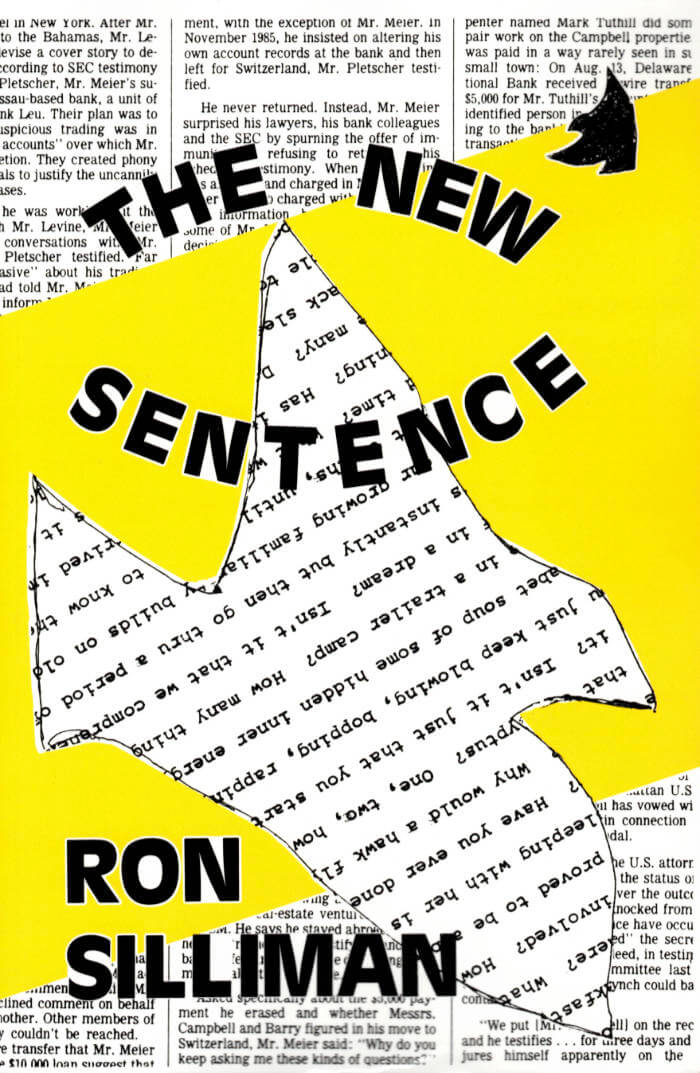
The New Sentence
Originally appearing in 1977 and now in its 11th printing, this classic collection of essays by one of the sharpest minds in American contemporary poetic thought remains Roof's best seller to date. It is a collection with rich insight into Silliman's own monumental poetical work and the writing of his peers, a book which both illuminates the concerns of the era in which it was written and radiates outward with a tremendous scope that continues to bear fruit for the contemporary reader.
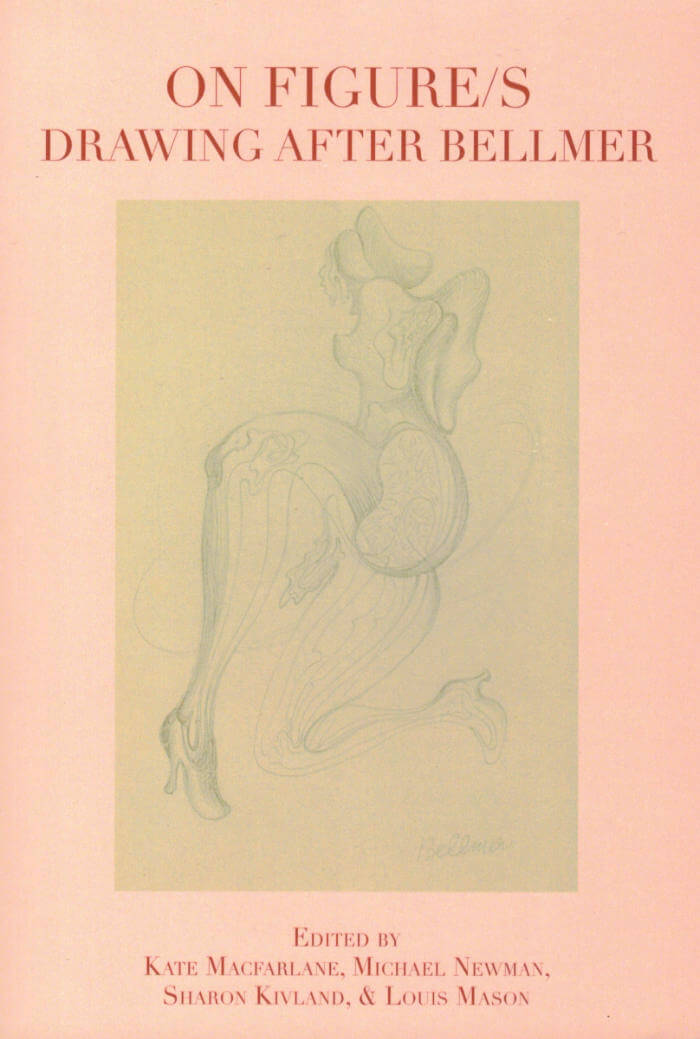
On Figure/s. Drawing After Bellmer
Louis Mason, Sharon Kivland and 2 more
Raised by a fascist father in Nazi Germany, the Surrealist artist Hans Bellmer (1902-1975) dedicated his œuvre to a perverse rewriting of the symbolic order. Famous for the two dolls he constructed in the mid-1930s, his transgressive ideas around the body as anagram were shared by his partner Unica Zürn. Both broke received codes of behaviour and the implicit rules of language, providing fertile ground for artists and other thinkers, including feminists, to similarly rewrite the body. ON FIGURE/S is published in parallel with the exhibition FIGURE/S: drawing after Bellmer (Drawing Room, London, September 2021). It gathers responses to its themes: body as letter, word and sentence; perversion and enjoyment; technical and forensic drawing in pursuit of pleasure; the other than human—becoming object, plant, animal. This book is a way to think through and with works of art and their histories, involving multiple textual forms, collage, and drawing, which take the radical and transgressive energy of Bellmer and Zürn in unexpected directions.
Contributors: Paul Buck, Lola Bunting , Alice Butler, Paul Chan, Iris Colomb, Vincent Dachy, Zoë Dowlen, Rachel Genn, Aurelia Guo, Mathew Hale, Tom Hastings, Rebecca Jagoe, Sharon Kivland, Sarah Lederman, Kate Macfarlane, Kumi Machida, Louis Mason, Reba Maybury, Jade Montserrat, John Murphy, Michael Newman, Bernard Noël, Tamarin Norwood , Francesco Urbano Ragazzi, Aura Satz, Sophie Seita, Anne Lesley Selcer, Isabel Seligman, Sarah Wilson
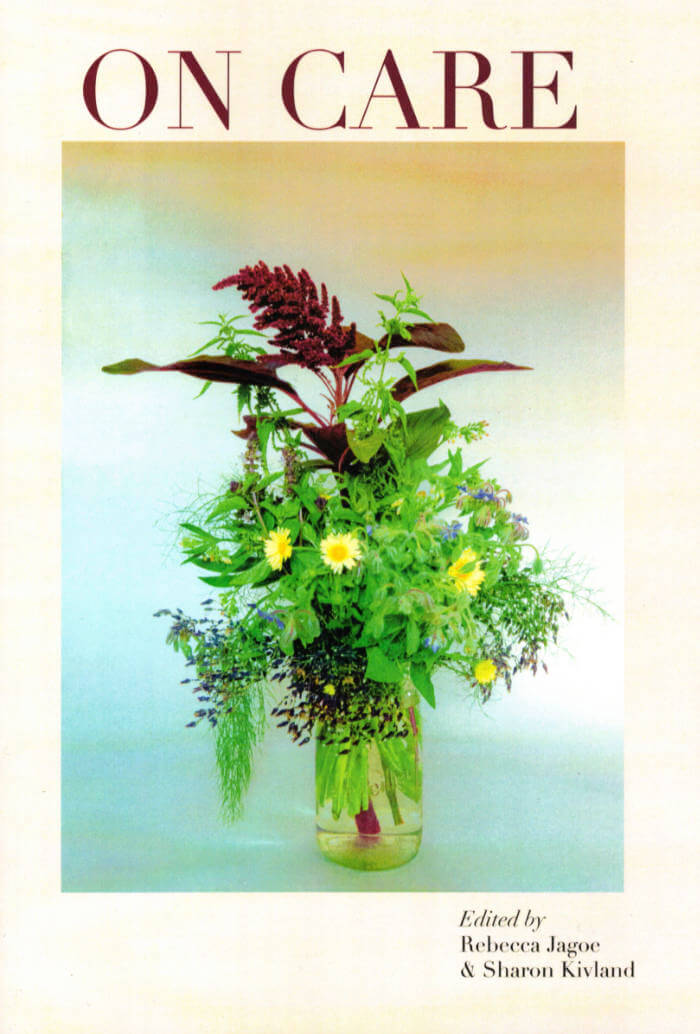
On Care
Care is a matter of responsibility for human and nonhuman allies, an ecological network. Care is an imperative, and acting with care approaches the world beyond selfhood. ON CARE, an aggregate of voices, discusses the politics of caring, support, and the role of welfare in an increasingly neoliberal society. It questions who is seen as worthy of care, whose narratives are given attention, and whose lives are overlooked in a complex web of assemblages: conceptions of medical authority, the co-option of self-care in political rhetoric, care as a commodity in the hospitality industry, intergenerational intimacy, sexecology; care as utopian and care as transactional. ON CARE maps a constellation of perspectives, as testaments, fictions, and essays, addressing the relation between good health, interdependence, and the ethics of (self)care.
Contributors: Tom Allen, Uma Breakdown, Alice Butler, Oisín Byrne, Julia Calver, Jamie Crewe, Juliette Desorgues, Rachel Genn, Laura Godfrey-Isaacs, Laura González, Holly Graham, Helen Hester, Justin Hogg, Juliet Jacques, Mati Jhurry & Rebecca Jagoe, Juliet Johnson, Sophie Jung, Daisy Lafarge, Elisabeth Lebovici, Rebecca Lennon, Rona Lorimer, Katharina Ludwig, Mira Mattar, Martina Mullaney, Cinzia Mutigli, Carolina Ongaro, Molly Palmer, Roy Claire Potter, Nat Raha, Helena Reckitt, Ruiz Stephinson, Erica Scourti, Victoria Sin, Himali Singh Soin & Tyler Rai, Miguel Soto Karlovic, Isabella Streffen, Jamie Sutcliffe, Maija Timonen, Lynn Turner, Rosa-Johan Uddoh, Daniella Valz Gen, Nina Wakeford, Alberta Whittle
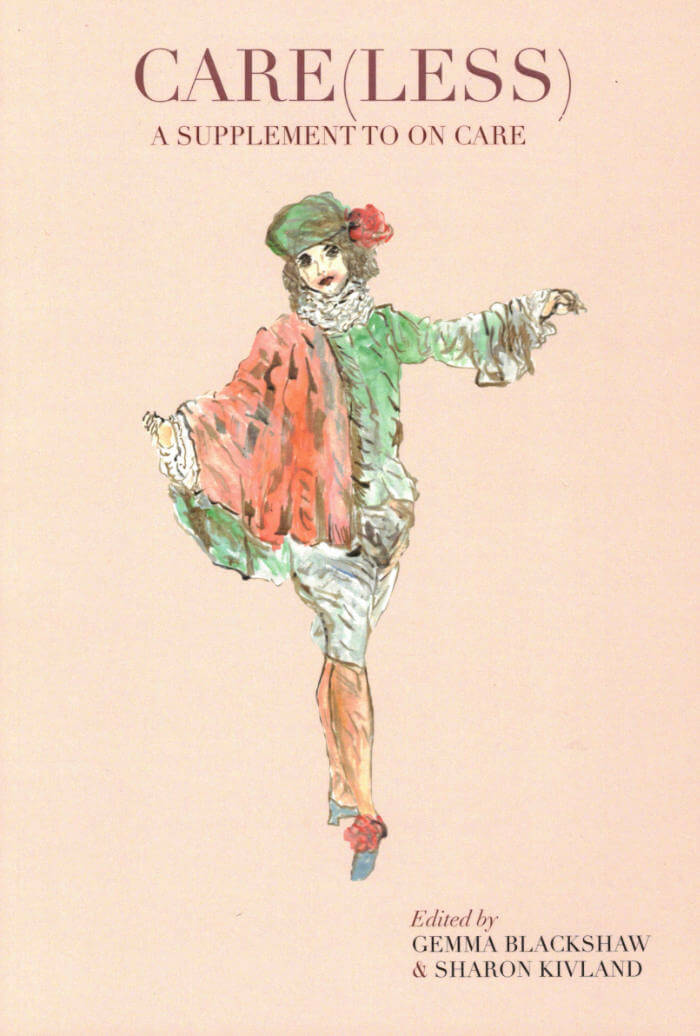
Care(less). A Supplement To On Care
Gemma Blackshaw, Sharon Kivland
The harshest of lights shines on the question of care in the age of neo-liberalism and globalisation: who gets it, who needs it, who does it, who controls it. The Care research group at the Royal College of Art works in this light to ask how to care for human bodies in the inequitable societies COVID-19 has re-inscribed, through the activation of creative research practices as means of caring. Reflecting on the care phenomenon of 2020/21, the group invited the editors of ON CARE (MA BIBLIOTHÈQUE, 2020) to return to their book conceived before the pandemic. As part of that discussion, the group was asked to consider what is lack of care and what lacks in care. Their responses form this supplement to ON CARE, working with what was at hand, with what was missed, forgotten, neglected, ignored: CARE(LESS).
Contributors: Sohaila Baluch, Gemma Blackshaw, Anja Borowicz, Caroline Douglas, Shannon Forrester, Marita Fraser, Nora Heidorn, Ameera Kawash, Sofie Layton, Joshua Leon, Xiaoyi Nie, Amy Peace Buzzard, Ilona Sagar, Dafne Salis, Adam Walker, Sharon Young, Shuye Zhang
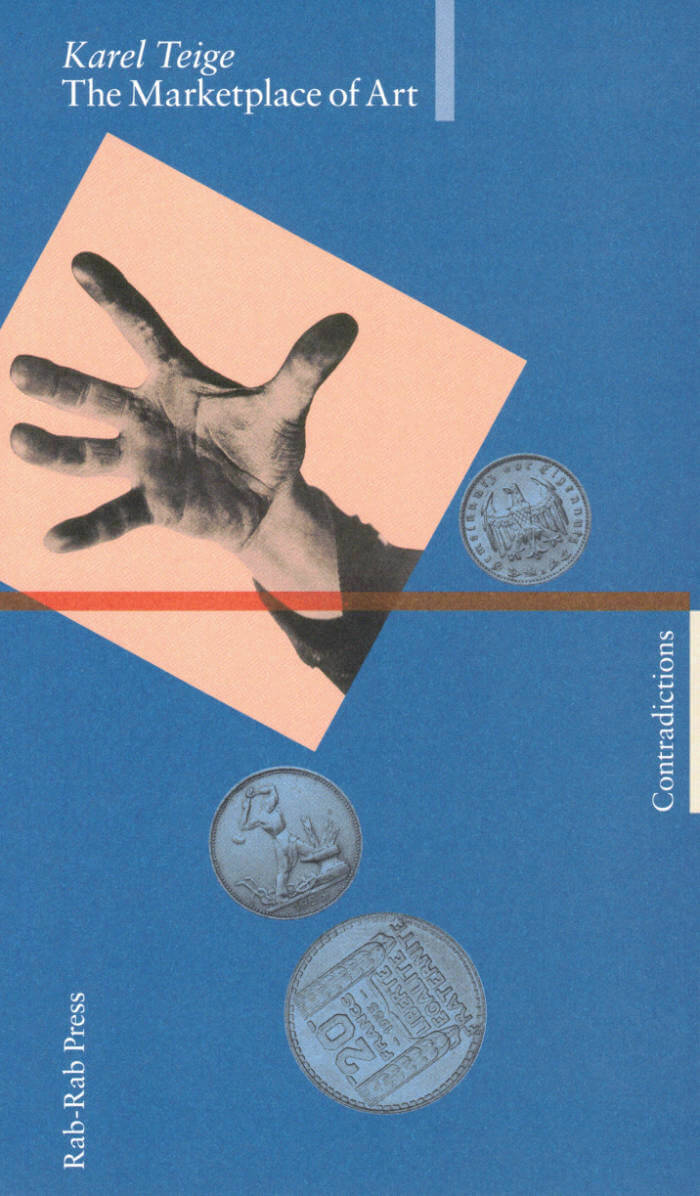
The Marketplace of Art / Commentary
The first English translation of Karel Teige's The Marketplace of Art in two volumes includes a critical introduction, inquiries, and extensive commentaries. Originally published in the Czech language in 1936, The Marketplace of Art is the summation of Teige's artistic, political, and theoretical work.
Acclaimed as one of the leading theoreticians of avant-garde art and architecture between the two world wars, Teige's more political writings still remain to be discovered. Written in 1936, in the context of the rising conservative right-wing culture, and during the intense debates between the avant-garde artists and the Communist Party, The Marketplace of Art is a response to the capitulation of contemporary art to fascist and Stalinist currents. Teige discusses this reaction as something deeply inscribed into the culture of the bourgeoisie, which he claims is a culture "not able to create and inspire any other kind of art besides a hollow and pompous academism or sentimental kitsch." Teige's Marxist analysis of the art market shows in which way this culture is tied with capitalist institutions and he offers artistic and political strategies to oppose its absolutism. In today's warmongering culture of authoritarian neoliberalism where the contemporary art market is run by oligarchs, Karel Teige's radical critique of the art market is more relevant than ever.
Rab-Rab Press presents this long-awaited translation with an accompanying volume of commentaries and interventions. Edited and introduced by Sezgin Boynik and Joseph Grim Feinberg, the book is published in collaboration with Contradictions/Kontradikce Journal based in Prague. The commentary volume includes commissioned essays by Zbyněk Baladrán, Dave Beech, Jana Ndiaye Berankova, Michel Chevalier, Esther Leslie, John Roberts, and Paul Wood, as well as an inquiry on The Marketplace of Art with responses from František Dryje, Tomáš Hříbek, Rea Michalová, Šimon Svěrák, and Roman Telerovský.
Czech artist, critic, and art theorist Karel Teige (1900-1951), close to the French Surrealists, founder of the Devětsil group in 1920, and member of Leva Fronta (The Left Front), was one of the most important figures of the Czech avant-garde.

Notes on Evil
An investigation into the current social architectures that determine the perception of the notion of "evil"... and the production of figures that embody it.
What is evil? How is it categorized, understood, and used as a tool? Surveying recent examples of "evil" which have taken hold in mass culture, Notes on Evil examines the mechanisms by which societies construct new enemies in a collective bid to rid themselves of their problems, usually culminating in largely superficial or aestheticized purges. Do societies necessarily need to create evil villains in order to function? And is the villain's role best understood as that of a court jester, who symbolically appears to mock the sovereign, while actually reinforcing their position of power?
Artist and writer Steven Warwick reflects on the overlapping social architectures which frame our current discourse on good and evil, ultimately charting a path beyond our present climate of reductivism, false binaries, and collective impasse.
Steven Warwick is a British artist, musician and writer residing in Berlin. His practice includes durational performance installations, plays and films using the construction of situations and language. He also makes music under his own name, and previously as Heatsick. His writing has appeared in Texte zur Kunst, Frieze, Urbanomic, Artforum, Spike and Electronic Beats and has co-authored a book released on Primary Information.

Faux Pas: Selected Writings and Drawings (2nd edition)
This new edition of Faux Pas, the acclaimed collection of writings by Amy Sillman, comes as an expanded edition, with the addition of new essays, including recent texts on Paul Cézanne, Carolee Schneemann, Elizabeth Murray and Louise Fishman. The previously unpublished text from a lecture on drawing complements Sillman's views on color and shape. New drawings from 2020-22 include a selection of works on paper that were part of the artist's installation at the 59th International Venice Biennale, The Milk of Dreams, in 2022.
Since the 1970s, Sillman, a beloved and key figure of the New York art scene, has developed a singular body of work that includes large-scale gestural paintings blending abstraction with representation, as well as zines and iPad animations.
Over the past decade, Sillman has also produced stimulating essays on the practice of art or the work of other artists: for example, reevaluating the work of the abstract expressionists with a queer eye; elaborating on the role of awkwardness and the body in the artistic process; and discussing in depth the role and meanings of color and shape. Featuring a foreword by Lynne Tillman, Faux Pas gathers a significant selection of Sillman's essays, reviews and lectures, accompanied by drawings, most of them made specially for the book.
Faux Pas aims at revealing the coherence and originality of Sillman's reflection, as she addresses the possibilities of art today, favoring excess over good taste, wrestling over dandyism, forms over symbols, with as much critical sense as humor.
Based in New York City, Amy Sillman (born 1955) is an artist whose work consistently combines the visceral with the intellectual. She began to study painting in the 1970s at the School of Visual Arts and she received her MFA from Bard College in 1995. Her work has been exhibited internationally, including at the Whitney Biennial in 2014 and the Venice Biennale in 2022; her writing has appeared in Bookforum and Artforum, among other publications. She is currently represented by Gladstone Gallery, New York.
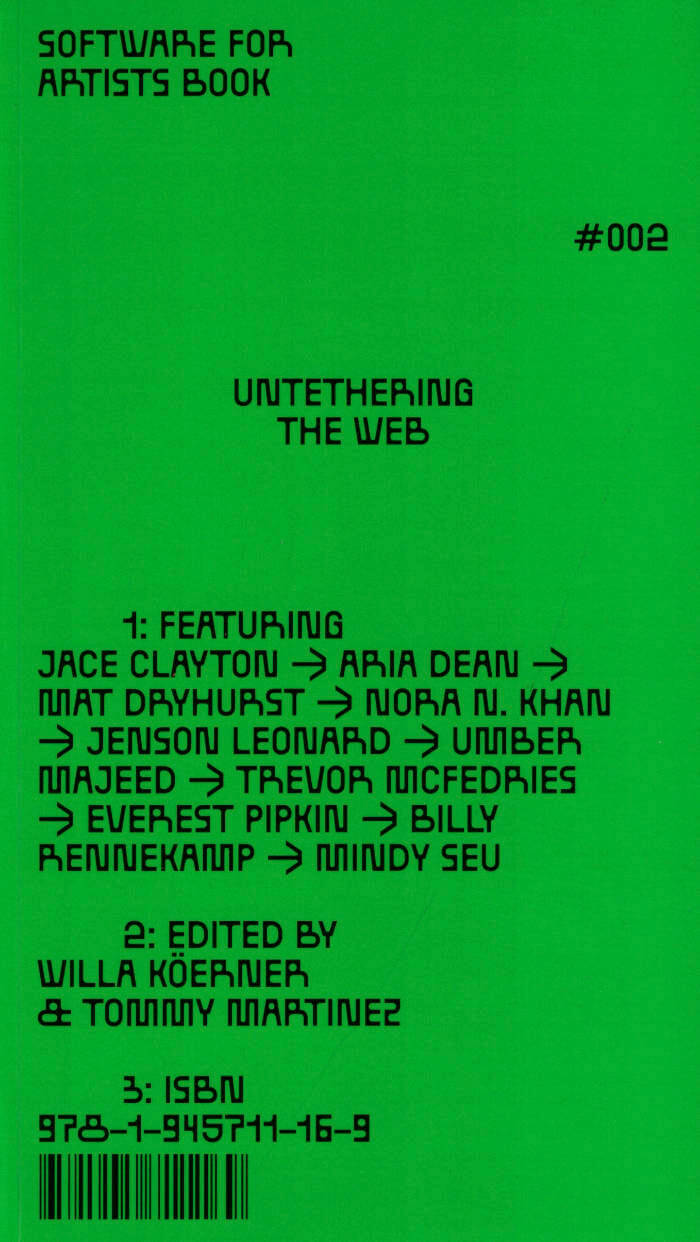
Software for Artists Book: Untethering the Web
A compendium of creative texts examining our complex and slippery relationships with new technologies.
What will the internet of the future make possible? Untethering the Web explores the technologies, strategies and anxieties that are coalescing in 2022 to shape a new digital paradigm. As naturalized citizens of today's always-online world and as survivors of a multiyear pandemic, the need to reform our digital tools and approaches is more pressing than ever before.
Evolved models for virtual convening, collective organizing and digital ownership are making this possible, and a reckoning for the platformed web and its monolithic tech giants is beginning to feel imminent—but how will it all unfold, and what new pitfalls will emerge? In conjunction with Pioneer Works' seventh Software for Artists Day, in October 2022, creators, technologists and members of our community share their visions for a flourishing digital multiverse, and how they imagine it manifesting over time.

Anarchism and Other Essays
In the 1890s and for years thereafter, America reverberated with the name of the notorious Anarchist, feminist, revolutionist, and agitator, Emma Goldberg. A Russian Jewish immigrant at the age of 17, she moved by her own efforts from seamstress in a clothing factory to internationally known radical lecturer, writer, editor, and friend of the oppressed. This book is a collection of her remarkably penetrating essays, far in advance of their time, originally published by the Mother Earth press which she founded.
In the first of these essays, Anarchism: What It Really Stands For, she says, Direct action, having proven effective along economic lines, is equally potent in the environment of the individual. In Minorities Versus Majorities she holds that social and economic well-being will result only through the non-compromising determination of intelligent minorities, and not through the mass. Other pieces deal with The Hypocrisy of Puritanism; Prisons: A Social Crime and Failure; The Psychology of Political Violence; The Drama: A Powerful Disseminator of Radical Thought; Patriotism: A Menace to Liberty; and The Tragedy of Woman's Emancipation. A biographical sketch by Hippolyte Havel precedes the essays.
Anarchism and Other Essays provides a fascinating look into revolutionary issues at the turn of the century, a prophetic view of the social and economic future, much of which we have seen take place, and above all, a glimpse into the mind of an extraordinary woman: brilliant, provocative, dedicated, passionate, and what used to be called high-minded.

Abolish the Family: A Manifesto for Care and Liberation
What would it be like to imagine a communism not just of wealth but also of care, love and belonging? Where the full range of human needs are met without depending on the fragile bubble of the nuclear family? That institution we are all supposed to believe will be there for us—even though so many books and films detail all the ways in which it fails. This is the difficult yet important terrain where Sophie Lewis ventures. Abolish the Family is a short, sharp shock to our assumptions about the good life and how to achieve it.
Sophie Lewis is a freelance writer living in Philadelphia, teaching courses for the Brooklyn Institute for Social Research. Her first book was Full Surrogacy Now: Feminism Against Family, and her essays have appeared in the New York Times, Harper's, Boston Review, n+1, the London Review of Books and Salvage. Sophie studied English, Politics, Environment and Geography at Oxford, the New School, and Manchester University, and is now an unpaid visiting scholar at the Feminist, Queer and Transgender Studies Center at the University of Pennsylvania.

Theory of the Gimmick: Aesthetic Judgment and Capitalist Form
Acclaimed critic Sianne Ngai theorizes the gimmick as an aesthetic category reflecting the fundamental laws of capitalism. Gimmicks make promises of saving labor and increasing value that we distrust but also find attractive. Exploring the use of this form, Ngai shows how its aesthetic dissatisfactions reflect deeper anxieties about capitalism.
Sianne Ngai is Andrew W. Mellon Professor of English at the University of Chicago. She is the author of Ugly Feelings and Our Aesthetic Categories: Zany, Cute, Interesting, winner of the Modern Language Association's James Russell Lowell Prize. Her work has been translated into multiple languages.

Silence: Lectures and Writings
Silence: Lectures and Writings is a book by American experimental composer John Cage (1912–1992), first published in 1961 by Wesleyan University Press. Silence is a collection of essays and lectures Cage wrote during the period from 1939 to 1961.
Most of the works are preceded by a short commentary on their origins, some have an afterword provided. Several works feature unorthodox methods of presentation and/or composition. "The Future of Music: Credo" juxtaposes paragraphs of two different texts. The text of the first part of "Composition as Process" is presented in four columns, the text of "Erik Satie" in two. "45' for a Speaker" is similar to Cage's "time length" compositions: it provides detailed instructions for the speaker as to exactly when a particular sentence or a phrase should be said. "Where Are We Going? and What Are We Doing?" is presented in several types of typeface to better reflect the concept of the lecture, which was originally presented as four tapes running simultaneously. "Indeterminacy" is a collection of various anecdotes and short stories taken from life or books Cage read: the concept is to tell one story per minute, and to achieve the speaker has to either speed up or slow down, depending on the length of the story.
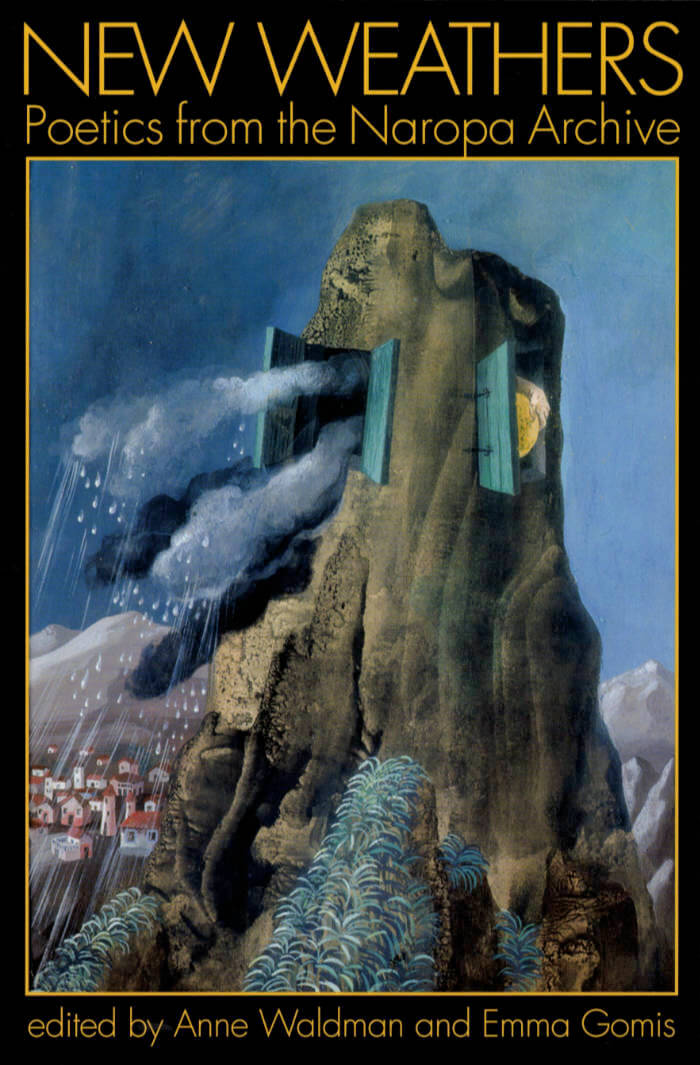
New Weathers: Poetics from the Naropa Archive: Lectures from the Naropa Archive
A collection of lectures transcribed from the audio archives of Naropa University's Summer Writing Program that represent a continuing lineage of experimental literary movements.
New Weathers asks us to consider how poetics might embolden deeper engagements with the world. Collected from the alternative education zone founded by Anne Waldman and Allen Ginsberg with the aim of opening up discourse and fostering political engagement, these texts invoke issues of gender and race-based injustice, the global climate crisis, and our possible extinction. They weave through our poetic community, the conversations we are having, the issues we are facing—our "new weathers" to posit strategies of resistance.
List of Contributors: Paula Gunn Allen, Amiri Baraka, Dan Beachy-Quick, Sherwin Bitsui, Robin Blaser, William S. Burroughs, Julie Carr, J'Lyn Chapman, Jos Charles, Jack Collom, Samuel R. Delany, kari edwards, Tongo Eisen-Martin, Tonya M. Foster, Forrest Gander, Alan Gilbert, Allen Ginsberg, Renee Gladman, Robert Glück, Lyn Hejinian, Lisa Jarnot, Kevin Killian, Thurston Moore, Fred Moten, Eileen Myles, Hoa Nguyen, Alice Notley, Akilah Oliver, M. NourbeSe Philip, Margaret Randall, Roger Reeves, Ariana Reines, Lisa Robertson, Ed Sanders, Andrew Schelling, Cedar Sigo, Eleni Sikelianos, Harry Smith, Edwin Torres, Cecilia Vicuña, Asiya Wadud, Peter Warshall, Eliot Weinberger, Peter Lamborn Wilson, and Ronaldo V. Wilson.